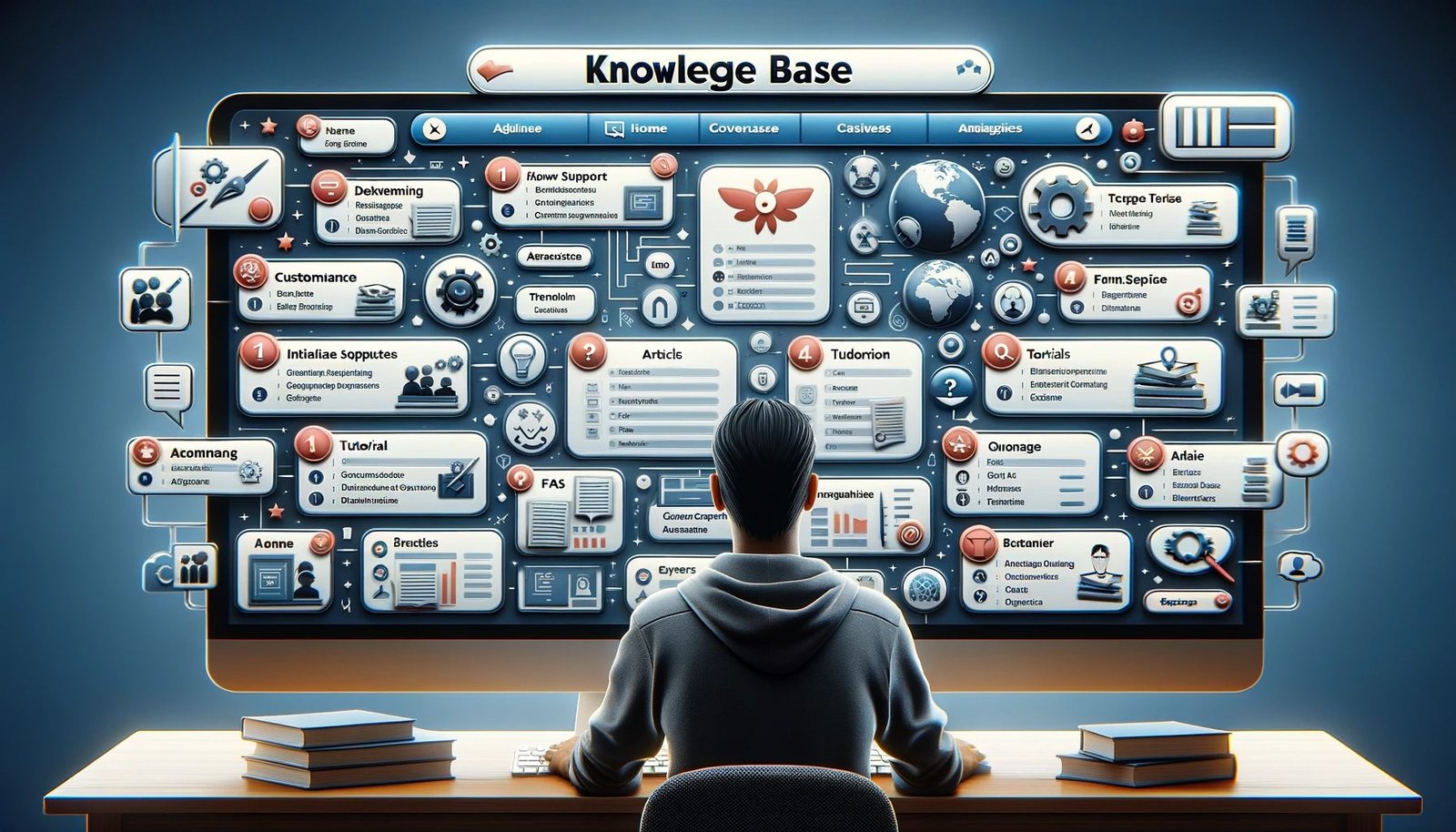Knowledge Base Software Alternatives to ChatGPT Customer Service: The Secret Weapon to Empowering Your Customers
Knowledge Base Software Alternatives to ChatGPT Customer Service: The Secret Weapon to Empowering Your Customers
Introduction – Knowledge Base Software Alternatives to ChatGPT Customer Service
In an age where information is at our fingertips, customers increasingly prefer to find answers on their own rather than wait for support. This self-service approach not only empowers the customer but also reduces the load on customer support teams. Knowledge-based software, akin to platforms like WordPress for educational websites, has emerged as a pivotal tool in this paradigm shift, offering a reservoir of information that customers can tap into at any time.
The significance of self-service in modern customer support
Self-service, much like the trend towards WordPress web development for education, is no longer just an added bonus; it’s a necessity. Today’s consumers are tech-savvy, independent, and value their time. They’d rather quickly search for a solution than wait in a queue for support. This shift is evident in the rise of FAQs, forums, and chatbots. But while these tools offer quick fixes, they can’t replace the depth and breadth of information a knowledge base provides. A well-structured knowledge base acts as a comprehensive guide, offering solutions to common issues, detailed product information, and more. It’s like having a 24/7 support agent, always ready to assist, similar to the constant availability of WordPress web development services.
Introducing the concept of knowledge base software as a secret weapon for businesses
In the arsenal of customer support tools, knowledge-based software is the unsung hero. It’s more than just a repository of information; it’s a dynamic platform that evolves with your product and customer needs. Businesses that have harnessed its power, much like those leveraging WordPress web development for freelancers, often see reduced support tickets, increased customer satisfaction, and enhanced brand loyalty. Moreover, with the integration capabilities of modern knowledge base solutions, businesses can offer a seamless experience, linking articles to chatbots, integrating with CRM systems, and even using AI to suggest relevant articles to customers. In essence, a knowledge base is not just a tool; it’s a strategy, positioning businesses at the forefront of customer-centricity.

ChatGPT in Customer Service: A Brief Overview
In the vast realm of artificial intelligence and its applications in customer service, ChatGPT stands tall as a revolutionary tool. Originating from OpenAI, the same entity responsible for groundbreaking innovations like DALL-E, ChatGPT has redefined the boundaries of conversational AI.
A quick look at ChatGPT and its capabilities
ChatGPT, a variant of the GPT (Generative Pre-trained Transformer) model, is designed to generate human-like text based on the input it receives. Its prowess lies in its ability to understand context, provide relevant responses, and engage in fluid conversations. With each iteration, from GPT-2 to the more advanced GPT-3, the model has seen enhancements in its ability to handle intricate dialogues, making it a preferred choice for businesses looking to automate their customer interactions. This AI-driven approach, akin to the trend of WordPress web development for startups, offers scalability and efficiency.
How businesses have been leveraging ChatGPT for customer interactions
Businesses across the spectrum, from e-commerce platforms to WordPress blog websites, have tapped into the potential of ChatGPT. The reasons are manifold:
- Instantaneous Responses: In an age where customers expect swift replies, ChatGPT ensures no query goes unanswered, irrespective of the volume.
- 24/7 Availability: Unlike human agents, ChatGPT doesn’t need breaks, ensuring round-the-clock customer support.
- Cost Efficiency: Implementing ChatGPT can lead to significant savings in the long run, reducing the need for large customer service teams.
- Consistent Quality: With ChatGPT, businesses can guarantee a consistent quality of response, devoid of human errors or mood fluctuations.
- Integration with Other Platforms: ChatGPT can be seamlessly integrated with other tools, be it CRM systems or platforms like WordPress, for e-commerce website development, offering a holistic customer service experience.
In essence, ChatGPT has not only streamlined customer interactions but has also set a new benchmark in AI-driven customer service, much like the standards set by WordPress web development services in the realm of website creation.
The Power of Self-Service: Why Knowledge Base Software?
In today’s fast-paced digital landscape, customers are more informed and self-reliant than ever before. They prefer finding answers on their own rather than waiting in long queues for support agents. This shift in consumer behavior underscores the importance of self-service tools, particularly knowledge-based software, in modern customer support strategies.
The limitations of relying solely on conversational AI like ChatGPT
While conversational AI platforms like ChatGPT have revolutionized customer interactions with their instant responses and 24/7 availability, they aren’t without limitations:
- Depth of Knowledge: ChatGPT, despite its advanced capabilities, might not always have the depth of knowledge specific to a company’s products or services, unlike a curated knowledge base.
- Complex Queries: For intricate issues that require step-by-step guidance, a chatbot might fall short compared to detailed articles or tutorials.
- Human Touch: Some customers still prefer the nuance and empathy of human interaction, especially for sensitive issues.
- Over-reliance: Sole dependence on AI can lead to gaps in customer service, especially if the AI misunderstands a query or faces an unprecedented question.
- Integration with Existing Systems: While ChatGPT can be integrated with platforms like WordPress for agencies, setting it up to access company-specific data in real time can be challenging.
The benefits of empowering customers with self-service tools
Knowledge base software, often seen as the backbone of self-service, offers several advantages:
- Instant Access to Information: Customers can quickly find answers without waiting, leading to increased satisfaction.
- Reduced Support Tickets: A comprehensive knowledge base can significantly reduce the number of queries directed to the support team.
- Scalability: As the business grows, the knowledge base can be easily expanded without significant additional costs.
- Consistency: Every customer gets the same, consistent information, ensuring there’s no miscommunication.
- Feedback Loop: Businesses can track which articles are most accessed or where customers drop off, providing insights for improvement.
- Integration Capabilities: Knowledge bases can be seamlessly integrated with other tools, be it CRM systems or platforms like WordPress for e-commerce website development, offering a holistic customer service experience.
While conversational AI, like ChatGPT, plays a pivotal role in modern customer support, the importance of knowledge-based software cannot be understated. It’s not about choosing one over the other but leveraging both in tandem to offer a comprehensive, efficient, and effective customer support experience.
Knowledge Base Software Alternative 1: Confluence
Confluence, developed by Atlassian, is a collaboration tool that allows teams to create, share, and collaborate on documents in real time. While it’s often associated with software development and project management, its capabilities as a knowledge-base software are profound and worth exploring.
Overview and standout features of Confluence
1. Collaborative Editing: Confluence offers real-time collaborative editing, allowing multiple team members to work on a document simultaneously. This ensures that the knowledge base remains up-to-date and incorporates insights from various departments.
2. Integration with Atlassian Suite: Confluence seamlessly integrates with other Atlassian products like Jira, Trello, and Bitbucket. This means that support tickets, project boards, and code repositories can be linked directly to relevant knowledge base articles.
3. Customizable Templates: With a variety of templates available, businesses can create structured and consistent documentation. Whether it’s for FAQs, how-to guides, or product specifications, there’s a template for every need.
4. Advanced Search: The platform boasts a powerful search functionality, ensuring that customers can quickly find the information they’re looking for.
5. Permissions and Access Control: Confluence allows businesses to set granular permissions, ensuring that sensitive information remains restricted while public-facing articles are easily accessible.
6. Analytics: With in-built analytics, businesses can track which articles are most viewed, where customers spend the most time, and identify potential gaps in the knowledge base.
7. Mobile Accessibility: Confluence is mobile-responsive, ensuring that customers can access the knowledge base on-the-go, from any device.
How Confluence can empower customers with organized information
Confluence’s strength lies in its structured approach to documentation. By creating a centralized repository of information, businesses can ensure that customers have a single source of truth to refer to. The platform’s hierarchical structure, with spaces, pages, and sub-pages, allows for organized categorization of articles, making navigation intuitive.
Moreover, with the ability to embed multimedia – be it videos, GIFs, or infographics – Confluence ensures that Content is engaging and caters to different learning styles. For businesses that use other Atlassian products, the integration capabilities mean that customers can have a seamless experience, moving from a support ticket in Jira to a solution article in Confluence with ease.
In essence, Confluence not only serves as a repository of information but as a tool that enhances the customer experience, driving self-service and reducing dependency on live support. This integration of knowledge base tools parallels the rise of platforms like WordPress for educational websites, ensuring that users have access to comprehensive, organized, and easily digestible information.
Knowledge Base Software Alternative 2: Helpjuice
Helpjuice stands out as a dedicated knowledge base software laser-focused on simplifying the process of creating, managing, and optimizing self-help resources. With its intuitive interface and powerful features, Helpjuice has positioned itself as a go-to solution for businesses of all sizes looking to enhance their self-service offerings.
Introduction to Helpjuice’s capabilities
1. Drag-and-Drop Editor: Helpjuice offers a user-friendly drag-and-drop editor, making it easy for teams to design and structure their knowledge base articles without any technical know-how.
2. Advanced Analytics: With in-depth analytics, businesses can gain insights into which articles are most popular, where customers drop off, and what search terms they’re using, allowing for continuous optimization.
3. Customizable Themes: Helpjuice provides a range of customizable themes, ensuring that the knowledge base aligns with the brand’s visual identity.
4. Instant Search: One of its standout features, the instant search functionality, provides users with article suggestions as they type, speeding up the information retrieval process.
5. Multi-Language Support: For businesses with a global customer base, Helpjuice supports multiple languages, ensuring that Content is accessible to a diverse audience.
6. Permission Controls: Businesses can control who sees what with granular permission settings, making it possible to have both internal and external-facing knowledge bases on the same platform.
7. Collaboration Features: Teams can collaborate on articles with features like comments, revision histories, and draft modes.
Benefits for businesses aiming to provide comprehensive self-help resources
Empowered Customers: With a well-organized knowledge base, customers can find solutions on their own, reducing the need for live support and enhancing overall satisfaction.
Reduced Support Costs: As customers self-serve their queries, there’s a noticeable reduction in support tickets, leading to cost savings.
Continuous Improvement: The analytics provided by Helpjuice allow businesses to continuously refine their Content, ensuring it remains relevant and helpful.
Brand Consistency: With customizable themes and layouts, businesses can ensure that their knowledge base feels like a natural extension of their brand.
Internal Collaboration: Beyond customer-facing benefits, Helpjuice serves as a valuable tool for internal teams, providing a centralized location for company documentation, policies, and procedures.
Incorporating a dedicated knowledge base software like Helpjuice can significantly enhance a business’s customer service strategy. Just as platforms like WordPress have revolutionized web development, tools like Helpjuice are reshaping how businesses approach self-service, making it more efficient, effective, and user-friendly.
Knowledge Base Software Alternative 3: Zendesk Guide
Zendesk Guide, a product of the renowned Zendesk suite, is a smart knowledge-based solution designed to enhance customer self-service and foster agent productivity. With its seamless integration capabilities and a plethora of features, Zendesk Guide has become a favorite for businesses aiming to provide a unified customer support experience.
Key features and functionalities of the Zendesk Guide
1. Content Curation: Zendesk Guide offers a rich content creation platform, allowing businesses to craft detailed articles, FAQs, and guides with ease.
2. AI-Powered Answer Bot: This feature assists customers by providing instant answers from the knowledge base, reducing the need for live agent interactions.
3. Customizable Themes: Businesses can tailor the look and feel of their knowledge base to align with their brand aesthetics.
4. User Segmentation: Content can be tailored to different user groups, ensuring that both customers and agents see the most relevant information.
5. Integrated Search: The powerful search functionality ensures users can quickly find the answers they’re looking for.
6. Collaboration Tools: Agents can draft, review, and collaborate on articles, ensuring content accuracy and relevance.
7. Analytics Dashboard: Businesses can gain insights into article performance, search terms, and user behavior, allowing for continuous optimization.
8. Multi-Language Support: Zendesk Guide supports content creation in multiple languages, catering to a global audience.
The advantage of integrating a knowledge base with other support channels
Unified Customer Experience: With Zendesk Guide being a part of the Zendesk suite, businesses can provide a consistent support experience, whether customers are seeking self-help, chatting with an agent, or sending an email.
Efficient Ticket Resolution: When agents have access to a comprehensive knowledge base, they can resolve tickets faster by referencing or linking to relevant articles.
Reduced Ticket Volume: As customers find answers on their own through the knowledge base, there’s a noticeable decrease in the number of support tickets generated.
Consistent Information: Integration ensures that the information provided across all support channels is consistent, reducing confusion and enhancing trust.
Feedback Loop: Agents can easily flag outdated or unclear articles, ensuring the knowledge base remains a reliable resource.
Cross-Channel Analytics: By integrating the knowledge base with other support channels, businesses can get a holistic view of their customer support performance.
In the realm of customer support, having integrated tools like Zendesk Guide can be a game-changer. Just as WordPress web development for education has transformed online learning, integrated knowledge-based solutions are revolutionizing how businesses support and engage with their customers.

Knowledge Base Software Alternative 4: Document360
Document360 stands as a premier knowledge base platform, renowned for its user-centric design and robust features. Designed to cater to both small businesses and large enterprises, Document360 provides an intuitive environment for creating, managing, and optimizing knowledge bases. With its array of functionalities, businesses can ensure that their customers and employees have access to accurate, up-to-date information at all times.
Exploring Document360’s user-friendly platform
1. Intuitive Editor: Document360 offers a markdown editor, making it easy for users to format and structure their Content without needing any technical expertise.
2. Category Manager: Organizing Content is a breeze with the platform’s drag-and-drop category manager. This ensures that articles are logically grouped, making them easier for users to find.
3. Versioning: Businesses can maintain multiple versions of their documentation, which is especially useful for products that have different versions in the market.
4. SEO Features: Document360 comes with built-in SEO tools, ensuring that your knowledge base articles are optimized for search engines and drFeedbackganic traffic.
5. Feedback and Comments: Users can provide Feedback on articles, allowing businesses to continuously improve their content based on real user input.
6. Custom Branding: Companies can customize the look and feel of their knowledge base to align with their brand identity, offering a consistent user experience.
How businesses can create and manage knowledge bases efficiently
1. Collaborative Environment: Multiple team members can collaborate in real-time, drafting, reviewing, and publishing articles.
2. Analytics Dashboard: With in-depth analytics, businesses can understand user behavior, popular articles, search terms, and more, allowing for data-driven optimizations.
3. Integration Capabilities: Document360 can be integrated with popular platforms and tools, ensuring a seamless flow of information and enhanced productivity.
4. Access Control: Businesses can define user roles and permissions, ensuring that sensitive information is accessible only to authorized individuals.
5. Backup and Restore: The platform automatically backs up Content, and businesses can easily restore previous versions if needed.
6. AI-Powered Search: The platform’s search functionality is powered by AI, ensuring users find the most relevant articles quickly.
In the competitive realm of knowledge base platforms, Document360 shines with its user-centric approach and comprehensive features. Just as WordPress web development services have empowered businesses to create dynamic websites, platforms like Document360 are enabling companies to offer top-notch self-service experiences to their customers and employees.
Knowledge Base Software Alternative 5: Zoho Desk
Zoho Desk, a product of the renowned Zoho Corporation, is not just a ticketing tool but a comprehensive customer service software. One of its standout features is its knowledge base capabilities, designed to help businesses create, maintain, and optimize their support documentation. With a focus on enhancing the self-service experience, Zoho Desk’s knowledge base tools are both powerful and user-friendly.
A look into Zoho Desk’s knowledge management features
1. Article Editor: Zoho Desk offers a rich text editor, allowing users to create detailed articles with multimedia elements, making Content more engaging and informative.
2. Categorization and Tagging: Organize articles into categories and sub-categories and use tags for easier searchability, ensuring users find the information they need quickly.
3. SEO Optimization: Built-in SEO tools help businesses ensure their articles rank well in search engines, driving organic traffic to their knowledge base.
4. Feedback Mechanism: Users can rate articles, providing businesses with insights into the usefulness of their Content. This feedback loop ensures continuous improvement.
5. Multi-language Support: Cater to a global audience by offering articles in multiple languages, ensuring non-English speaking users can also benefit.
6. Responsive Design: The knowledge base is mobile-responsive, ensuring a seamless experience for users across devices.
7. Integration with Ticketing: Easily link knowledge base articles to support tickets, helping agents resolve issues faster by referencing relevant articles.
The potential for businesses to optimize their support documentation
1. Analytics and Reports: Understand which articles are most viewed and which ones need improvement, and identify gaps in your knowledge base.
2. Team Collaboration: Multiple team members can collaborate on articles, draft revisions, and get approvals before publishing.
3. Custom Branding: Customize the look of your knowledge base to match your brand, offering a consistent look and feel.
4. Access Control: Define who can view, edit, or publish articles, ensuring content accuracy and security.
5. Community Forums: Beyond the knowledge base, Zoho Desk offers community forums where users can ask questions, share solutions, and interact, further enhancing the self-service experience.
In the realm of customer support, having a robust knowledge base is crucial. Platforms like Zoho Desk, much like WordPress web development for education, are empowering businesses to offer top-tier self-service experiences. With its comprehensive features and user-centric design, Zoho Desk stands as a formidable alternative for businesses looking to elevate their support documentation.
Comparative Analysis: ChatGPT vs. Knowledge Base Software Alternatives
In the evolving landscape of customer support, businesses are constantly on the lookout for tools that can enhance the user experience. Both conversational AI platforms like ChatGPT and knowledge base software have their unique strengths and weaknesses. Let’s delve into a comparative analysis to understand which might be the best fit for different business scenarios.
Strengths and weaknesses of each platform
ChatGPT:
- Strengths:
- Real-time Interaction: Provides instant responses to user queries, enhancing user satisfaction.
- Scalability: Can handle a large number of queries simultaneously without any human intervention.
- Personalization: Offers personalized responses based on user input and past interactions.
- Integration Capabilities: This can be integrated with various platforms and tools, including CRM solutions.
- Weaknesses:
- Limited to Conversations: Primarily designed for chat interactions and might not provide detailed solutions.
- Dependency on Training: The quality of responses depends on the training data and continuous updates.
- Lacks Comprehensive Documentation: It doesn’t provide detailed articles or step-by-step guides like a knowledge base.
Knowledge Base Software (e.g., Zoho Desk, Confluence, Helpjuice):
- Strengths:
- Detailed Information: Offers in-depth articles, guides, and FAQs to address user queries.
- Organized Content: Categorized and tagged Content ensures easy navigation.
- SEO Benefits: Well-optimized articles can drive organic traffic from search engines.
- Multimedia Integration: Can include images, videos, and infographics for a richer user experience.
- Weaknesses:
- Not Real-time: Users might have to search and read through articles to find solutions.
- Maintenance: Requires regular updates to ensure the Content remains relevant.
- Lacks Personalization: Offers static Content that’s not tailored to individual user queries.
Suitability for different business sizes and industries
- Startups and Small Businesses: With limited resources, these businesses might benefit from ChatGPT for offering real-time support without hiring a large support team. However, a basic knowledge base can also be beneficial for frequently asked questions.
- Medium to Large Enterprises: These businesses often have diverse customer queries. A combination of ChatGPT for real-time interactions and a comprehensive knowledge base for detailed support can be ideal.
- Tech and Software Industries: Given the complexity of products, a detailed knowledge base is crucial. Platforms like WordPress web development for agencies often rely on extensive documentation.
- E-commerce and Retail: ChatGPT can be beneficial for instant query resolution, while a knowledge base can assist in addressing common queries about shipping, returns, and product details.
- Education and Training: Knowledge-based software shines here, offering detailed articles, tutorials, and guides. Platforms like WordPress for education often integrate extensive knowledge bases.
While ChatGPT offers the advantage of real-time, personalized interactions, knowledge-based software provides in-depth, organized Content. The choice between them—or the decision to integrate both—depends on the specific needs and goals of a business.
The Secret Weapon: How Knowledge Base Software Empowers Customers
In today’s digital age, customers expect instant solutions and prefer self-service over waiting in long queues for support. Knowledge-based software has emerged as a secret weapon for businesses, empowering customers in various ways. Let’s delve into how these platforms are revolutionizing the customer support landscape.
a. 24/7 Access to Information: Letting customers find answers on their own time
Unlike traditional customer support, which may be bound by time zones or working hours, a knowledge base is always available. Whether it’s a late-night query or an early-morning troubleshooting need, customers can access the information they require without any delays. This 24/7 availability ensures that businesses cater to a global audience, enhancing customer satisfaction. For instance, platforms like WordPress for freelancers often have users from various time zones, making round-the-clock information access crucial.
b. Reducing Support Tickets: Alleviating the load on customer service teams
A well-organized knowledge base addresses common queries, reducing the number of support tickets generated. This not only alleviates the load on customer service teams but also ensures faster resolution for customers. They no longer need to wait for a response when the answer is readily available in the knowledge base. This efficiency can be especially beneficial for businesses offering services like WordPress web development for small businesses, where common queries can be addressed without human intervention.
c. Enhancing User Experience: Providing organized, searchable Content
A knowledge base, with its categorized articles, tags, and search functionality, offers an intuitive user experience. Customers can quickly find what they’re looking for, leading to a positive interaction with the brand. This organized approach is often seen in platforms offering WordPress web development tutorials, ensuring users can easily navigate through vast amounts of Content.
d. Building Trust: Showcasing expertise and reliability
A comprehensive knowledge base showcases a company’s expertise in its domain. By providing detailed articles, guides, and solutions, businesses position themselves as reliable and trustworthy in the eyes of their customers. This trust-building is crucial for sectors like WordPress web development for agencies, where credibility plays a significant role in customer acquisition and retention.
e. Continuous Improvement: Using analytics to refine and update Content
Modern knowledge base software comes equipped with analytics tools. These tools provide insights into which articles are most accessed, where customers drop off, and what queries remain unanswered. Businesses can use this data to continuously refine their Content, ensuring it remains relevant and helpful. For instance, platforms specializing in WordPress web development SEO can update their articles based on changing SEO trends and user feedback.
In essence, knowledge-based software is not just a tool but a strategic asset for businesses. By empowering customers with information, reducing support tickets, and building trust, these platforms are redefining the paradigms of customer support and service.
Real-World Success Stories
In the dynamic world of customer support, many businesses have realized the limitations of solely relying on conversational AI platforms like ChatGPT. Transitioning to knowledge-based software has not only enhanced their customer support but also brought about tangible improvements in various aspects of their operations. Let’s explore some real-world success stories of businesses that made this strategic shift.
Case Study 1: TechSolutions Inc.
Background: TechSolutions Inc., a leading provider of WordPress web development for startups, initially used ChatGPT for handling customer queries.
Challenge: As their client base grew, the volume of repetitive queries increased, leading to longer response times and customer dissatisfaction.
Solution: The company transitioned to knowledge-based software, categorizing common queries and providing detailed solutions.
Outcome: TechSolutions Inc. saw a 40% reduction in support tickets within the first month. The self-service nature of the knowledge base also led to a 30% increase in customer satisfaction scores. Their team could focus on more complex issues, ensuring faster resolutions.
Case Study 2: FashionFiesta
Background: FashionFiesta, an e-commerce platform specializing in WordPress e-commerce website development, relied heavily on ChatGPT for customer interactions.
Challenge: With a diverse product range, customers often had queries related to size, shipping, and returns. The AI struggled to provide specific answers, leading to customer frustration.
Solution: FashionFiesta implemented knowledge-based software, creating detailed FAQs, product guides, and video tutorials.
Outcome: The platform experienced a 50% decrease in return requests, as customers could now access detailed product information. The knowledge base also reduced the load on their customer service team by 35%, leading to cost savings.
Case Study 3: HealthFirst Clinics
Background: HealthFirst Clinics, offering WordPress web development for healthcare, used ChatGPT for patient inquiries.
Challenge: Patients had concerns about procedures, insurance, and appointments. ChatGPT often provided generic answers, lacking the personalized touch patients sought.
Solution: The clinic introduced a knowledge base detailing procedures, insurance policies, and appointment guidelines.
Outcome: HealthFirst Clinics saw a 25% increase in patient engagement, with many praising the detailed information available. The clinic also noted a 20% increase in online appointment bookings, attributing it to the clarity provided by the knowledge base.
These success stories underscore the transformative potential of knowledge-based software. By addressing customer queries proactively and offering detailed, organized information, businesses can significantly enhance their customer support, leading to tangible benefits and improved customer relationships.
Implementing Knowledge Base Software: Best Practices
In the digital age, where customers expect instant answers, a well-structured knowledge base can be a game-changer. It not only reduces the strain on customer support teams but also empowers customers to find solutions independently. However, the effectiveness of a knowledge base hinges on its implementation. Here are some best practices to ensure your knowledge base is both user-friendly and effective.
Steps for Creating Effective, User-Friendly Content
1. Understand Your Audience
Before diving into content creation, understand who your audience is. Are they tech-savvy? What are their common queries? Use tools like SEO Audit & Reporting to gauge the most searched terms related to your business.
2. Write Clear and Concise Articles
Avoid jargon and complex language. Your Content should be easily understandable, even for someone unfamiliar with the topic. Tools like Rizve Joarder Website Design Services can help ensure your Content is visually appealing and well-structured.
3. Use Multimedia
Incorporate images, videos, and infographics where relevant. A visual guide can often be more effective than a wall of text, especially for complex topics.
4. Categorize and Tag Content
Ensure that articles are categorized logically. Use tags to help users navigate to related content easily.
Tips for Organizing and Updating the Knowledge Base
1. Implement a Search Function
A robust search function is crucial. It allows users to quickly find relevant articles without browsing through multiple categories.
2. Regularly Update Content
The information in your knowledge base should be current. Regularly reviewing and updating articles, especially Feedback, are changes in products, services, or feedback.
3. Gather Feedback
Include an option for users to provide feedback on articles. This can help you identify gaps in Content or areas that need clarification.
4. Monitor Analytics
Use analytics to track the most viewed articles, time spent on pages, and search terms used. This data can offer insights into areas that might need more detailed Content or topics that are of high interest to users.
5. Ensure Mobile Responsiveness
With many users accessing Content on mobile devices, ensure your knowledge base is mobile-responsive. Test it across different devices to ensure a seamless user experience.
6. Integrate with Other Support Channels
If a user doesn’t find an answer in the knowledge base, provide easy access to other support channels like chat or email. Integration with platforms like WordPress web development for customer support can streamline this process.
A knowledge base is more than just a repository of information. It’s a dynamic tool that, when implemented correctly, can significantly enhance the customer experience. By following these best practices, businesses can ensure their knowledge base is a valuable asset, driving customer satisfaction and loyalty.

The Future of Customer Support Tools
In an era where customer experience is paramount, businesses are constantly seeking innovative ways to meet and exceed customer expectations. The landscape of customer support tools, especially knowledge-based software and conversational AI, is evolving at a rapid pace. As we look to the future, several trends and predictions emerge that will shape the next generation of customer support.
Predictions and Trends for Knowledge Base Software and Conversational AI
1. AI-Powered Knowledge Bases
The integration of AI into knowledge-based software will become more prevalent. AI can analyze user behavior, search queries, and Feedback to automatically update and refine Content, ensuring that the most relevant and up-to-date information is always available.
2. Voice-Activated Support
With the rise of voice assistants like Alexa and Google Assistant, expect to see knowledge bases that are voice-search compatible. Customers will be able to verbally ask questions and receive spoken answers, enhancing the user experience.
3. Personalized User Experiences
Using data analytics and CRM solutions, knowledge bases will offer personalized content based on a user’s history, preferences, and behavior. This ensures that users receive information tailored to their specific needs and situations.
4. Seamless Integration with Other Tools
Knowledge bases will integrate more seamlessly with other business tools, from CRM systems to chatbots. This interconnected ecosystem will provide a more holistic and unified customer support experience.
5. Augmented Reality (AR) Support
Imagine pointing your phone at a product and instantly accessing a knowledge-based article or video tutorial. AR integration will make this possible, offering interactive and immersive support experiences.
6. Enhanced Security
With increasing concerns about data privacy and security, knowledge-based platforms will invest heavily in advanced security measures, ensuring that user data is protected and compliant with regulations.
7. Expansion of Conversational AI Capabilities
ChatGPT and other conversational AI tools will become more sophisticated, understanding context better and offering more human-like interactions. They’ll work in tandem with knowledge bases, guiding users to detailed articles when needed.
How Businesses Can Stay Ahead of the Curve
- Continuous Learning: Stay updated with the latest advancements in customer support technology. Attend workshops and training sessions to gain insights into emerging tools and strategies.
- Feedback Loop: Regularly gather Feedback from customers and support teams. This will help in identifying gaps and areas for improvement.
- Invest in R&D: Experiment with new tools and technologies. Pilot programs can be a great way to test the waters before a full-scale implementation.
- Collaborate Partner with technology providers, industry experts, and other businesses to share knowledge and best practices.
- Prioritize Customer Needs: Always keep the customer at the center of any technological adoption. Ensure that any new tool or strategy aligns with their needs and preferences.
The future of customer support tools is bright, with numerous innovations on the horizon. By staying informed, adaptable, and customer-centric, businesses can leverage these advancements to offer unparalleled support experiences, setting them apart in a competitive marketplace.
Conclusion
In today’s fast-paced digital landscape, where customers demand instant answers and seamless experiences, the role of knowledge base software cannot be overstated. It stands as a secret weapon in the arsenal of businesses, big and small, aiming to empower their customers. By providing 24/7 access to vital information, reducing the burden on customer support teams, and enhancing overall user satisfaction, knowledge bases have proven their worth time and again.
While conversational AI tools like ChatGPT offer incredible value in real-time interactions, the comprehensive, organized, and self-serve nature of knowledge base platforms addresses a different, equally crucial aspect of customer support. They cater to the modern customer’s desire for autonomy, allowing them to find solutions on their own terms and at their own pace.
For businesses, the decision isn’t about choosing between conversational AI and knowledge base software but understanding how each can complement the other. It’s about creating a cohesive ecosystem where customers feel heard, valued, and empowered.
As we move forward, the evolution of customer support tools will continue, with innovations and advancements shaping the way businesses interact with their customers. It’s an exciting time, and businesses have a plethora of tools at their disposal. The challenge, and indeed the opportunity, lies in exploring these options, understanding their unique strengths, and finding the best fit that aligns with both business objectives and customer expectations.
So, to businesses striving for excellence in customer support: Dive in, explore the world of knowledge base software and unlock the potential of truly empowered customers. Your customers will thank you, and your business will reap the rewards.
Dear readers, as we wrap up this exploration into the world of knowledge-base software and its transformative potential, we’d love to hear from you. Have you had experiences with any of the platforms mentioned? How has the shift towards self-service impacted your business or your experience as a customer?
Your insights, experiences, and Feedback are invaluable. They not only enrich the conversation but also help businesses and customers alike make informed decisions. So, whether you’re a business owner who has successfully implemented a knowledge base, an employee who uses these tools daily, or a customer who has benefited from them, your story matters.
Join the conversation in the comments below, or reach out to us directly. Let’s discuss, debate, and envision the future of customer support tools together. As the landscape of customer service evolves, your voice plays a pivotal role in shaping its direction.
Here’s to a future where businesses and customers collaborate, communicate, and grow together. Share your story, and let’s embark on this journey of continuous improvement and innovation.
- Why are businesses exploring knowledge-based software alternatives to ChatGPT for customer service?
- While ChatGPT is a powerful conversational AI, some businesses require dedicated knowledge base platforms to create, organize, and share informational Content with their customers.
- Which knowledge-based software alternatives are popular among businesses?
- Platforms like Confluence, Zendesk Guide, and Helpjuice have gained popularity due to their robust features and user-friendly interfaces.
- How does a dedicated knowledge base software enhance customer self-service?
- By providing organized, searchable, and easily accessible information, customers can find answers to their queries without reaching out for support, leading to faster resolutions.
- Can you share a case study where a business improved its customer self-service rates using a knowledge-based alternative?
- [Insert a brief case study or reference] highlights how [Company Y] saw a 30% increase in self-service rates after implementing [Knowledge Base Software].
- How do knowledge-based software alternatives integrate AI functionalities?
- Many platforms now incorporate AI-driven search enhancements, content recommendations, and analytics to provide more relevant information to users and gather insights on content effectiveness.
- Is it possible to integrate ChatGPT into these knowledge-based software solutions?
- Yes, many knowledge base platforms offer API integrations, allowing businesses to incorporate ChatGPT for live chat support alongside their informational Content.
- How do knowledge-based software alternatives support multimedia Content like videos, infographics, and interactive guides?
- Modern platforms support rich content embedding, allowing businesses to create comprehensive and engaging articles that cater to various learning preferences.
- What are the SEO benefits of using dedicated knowledge base software?
- With SEO-friendly URLs, meta tags, and structured Content, businesses can improve the visibility of their knowledge-base articles on search engines, driving organic traffic.
- How do knowledge-based software alternatives facilitate feedback collection and content improvement?
- Features like content ratings, feedback forms, and analytics help businesses understand what Content is helpful and what needs refinement, ensuring continuous improvement.
- Why is empowering customers through a knowledge base considered a “secret weapon” for businesses?
- An empowered customer can resolve their queries independently, leading to reduced support tickets, increased satisfaction, and fostering trust and loyalty.










